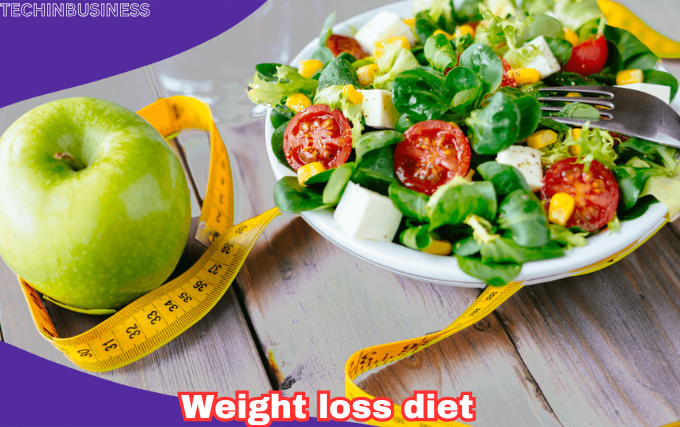In today’s world, the pursuit of a healthy lifestyle has become more important than ever. One of the key aspects of this journey is achieving and maintaining a healthy weight. The internet is flooded with information about weight loss diets, but it can be challenging to distinguish between what truly works and what’s simply a fad. A sustainable weight loss diet is not about quick fixes or extreme restrictions but about finding a balanced approach that supports overall health while helping you achieve your goals.
What is a Weight Loss Diet?
A weight loss diet refers to a strategic approach to nutrition that helps an individual reduce body weight by creating a calorie deficit. This means that the number of calories burned exceeds the number of calories consumed. However, a successful weight loss diet is not just about eating fewer calories—it’s about making informed choices that promote overall well-being.
Core Principles of a Weight Loss Diet
- Caloric Deficit: This is the foundation of any weight loss diet. The goal is to consume fewer calories than the body burns.
- Balanced Macronutrients: A good diet includes a balance of proteins, fats, and carbohydrates to provide the body with necessary energy.
- Micronutrients: In addition to macronutrients, the body requires vitamins and minerals for optimal health.
- Hydration: Proper hydration supports metabolism, digestion, and overall body function.
- Consistency: Sustainable weight loss comes from making lasting lifestyle changes, rather than relying on short-term restrictions.
Why a Weight Loss Diet is Important
Maintaining a healthy weight is crucial for preventing various health conditions, including heart disease, diabetes, and joint problems. A weight loss diet, when approached healthily, can:
- Improve Heart Health: Maintaining a healthy weight reduces the risk of heart disease and hypertension.
- Enhance Insulin Sensitivity: Proper weight management helps the body regulate blood sugar levels.
- Boost Energy: A balanced diet can improve energy levels and overall vitality.
- Support Mental Health: Physical health and mental well-being are closely linked. Losing weight in a healthy way can boost mood and self-esteem.
The Basics of Creating a Weight Loss Diet Plan
Designing a weight loss diet plan involves several steps. It’s important to approach this with a mindset that prioritizes nourishment and long-term health rather than rapid results.
1. Calculate Your Caloric Needs
To begin, understanding how many calories your body needs to function is crucial. This depends on factors like age, gender, weight, activity level, and overall health. You can use tools like the Mifflin-St Jeor equation to estimate your Total Daily Energy Expenditure (TDEE).
- TDEE represents the number of calories you burn in a day, including all activities.
- To lose weight, aim for a calorie intake that’s 10-20% lower than your TDEE.
2. Focus on Nutrient-Dense Foods
Choosing whole, nutrient-dense foods ensures that you are fueling your body with the right vitamins, minerals, and macronutrients:
- Fruits and Vegetables: Rich in fiber, vitamins, and minerals.
- Lean Proteins: Chicken, fish, beans, and legumes support muscle mass and help manage hunger.
- Whole Grains: Brown rice, quinoa, and oats provide steady energy.
- Healthy Fats: Avocados, nuts, seeds, and olive oil contribute to satiety and support healthy cell function.
3. Monitor Portion Sizes
Even healthy foods can contribute to weight gain if eaten in large quantities. Paying attention to portion sizes can help you stay within your calorie goals. Tools like food diaries or apps can help you track your intake and ensure you are not overeating.
4. Balance Macronutrients
A well-rounded diet includes:
- Protein: Supports muscle repair and growth, and keeps you full longer.
- Carbohydrates: Provide energy, but prioritize complex carbs (whole grains, vegetables) over refined sugars and processed foods.
- Fats: Healthy fats, such as those found in nuts, seeds, and fish, promote satiety and are essential for nutrient absorption.
5. Stay Hydrated
Drinking water helps control appetite, supports metabolism, and enhances physical performance. Aim for at least 8 cups of water a day, more if you are active or live in a hot climate.
Types of Weight Loss Diets
There is no “one-size-fits-all” when it comes to dieting. Different diets may work better for different individuals based on their lifestyle, preferences, and health needs. Below are some popular types of weight loss diets:
1. Low-Carb Diets (e.g., Keto, Atkins)
Low-carb diets are based on reducing carbohydrate intake, encouraging the body to burn fat for energy. The Keto diet, for example, drastically reduces carbs while increasing fat intake, leading to a state called ketosis.
- Benefits: Rapid weight loss, reduced appetite.
- Considerations: Can be challenging to maintain long-term. May lead to nutrient deficiencies if not properly balanced.
2. Mediterranean Diet
This diet emphasizes whole grains, lean proteins, healthy fats (like olive oil), fruits, and vegetables. It is not specifically designed for weight loss but promotes heart health and a balanced lifestyle.
- Benefits: Sustainable, heart-healthy, rich in antioxidants.
- Considerations: Requires consistent access to fresh, whole foods.
3. Intermittent Fasting
Intermittent fasting involves alternating periods of eating and fasting, often in a pattern like 16:8 (16 hours of fasting, 8 hours of eating). This approach can lead to calorie restriction naturally.
- Benefits: May help regulate insulin levels, improves digestion, and helps with fat loss.
- Considerations: Not suitable for everyone, especially those with certain health conditions.
4. Plant-Based Diets (e.g., Vegan, Vegetarian)
Plant-based diets exclude animal products, focusing on vegetables, fruits, grains, legumes, and nuts. These diets can be lower in calories and fat when done properly.
- Benefits: Reduces the risk of chronic diseases, promotes healthy digestion.
- Considerations: May require careful planning to ensure adequate protein and vitamin intake.
5. DASH Diet
The Dietary Approaches to Stop Hypertension (DASH) diet focuses on reducing sodium intake while promoting fruits, vegetables, lean proteins, and whole grains. It’s often recommended for people with high blood pressure, but also aids weight loss.
- Benefits: Supports heart health and weight management.
- Considerations: May be difficult to maintain in high-sodium environments.
Common Mistakes to Avoid in a Weight Loss Diet
While dieting, it’s easy to make mistakes that may derail progress. Common mistakes include:
- Skipping Meals: Missing meals can lead to overeating later in the day. It’s important to eat balanced meals regularly.
- Overemphasis on “Diet” Foods: Many processed foods marketed as “diet-friendly” are often low in nutrients and high in artificial additives.
- Not Eating Enough Protein: Protein helps control hunger and supports muscle mass, so neglecting it can slow metabolism.
- Neglecting Mental Health: Dieting isn’t just about food. Stress, lack of sleep, and negative thoughts can hinder your weight loss journey.
Staying on Track and Motivated
Long-term success with a weight loss diet is about consistency and perseverance. Here’s how to stay on track:
1. Set Realistic Goals
Focus on gradual weight loss (1-2 pounds per week) rather than drastic changes. Set achievable milestones that keep you motivated.
2. Find a Support System
Having a friend, family member, or support group to share your journey with can make the process more enjoyable and less isolating.
3. Reward Yourself
Celebrate your achievements, whether it’s a small treat or a fun activity that doesn’t involve food. This helps you stay motivated.
4. Be Patient
Remember that weight loss takes time, and the process may have ups and downs. Stay consistent and don’t get discouraged by minor setbacks.
Conclusion
A successful weight loss diet is about sustainable, healthy habits rather than quick fixes. By focusing on nutrient-dense foods, balanced macronutrients, and a caloric deficit, individuals can achieve long-term weight loss goals. Hydration, portion control, and a holistic approach to health, including mental well-being, are also essential. Various diet options, such as low-carb, plant-based, or intermittent fasting, offer flexibility for different lifestyles. The key to lasting weight loss is consistency, gradual progress, and finding a diet plan that fits personal needs. Patience, persistence, and a balanced mindset are essential for achieving and maintaining a healthy weight.


